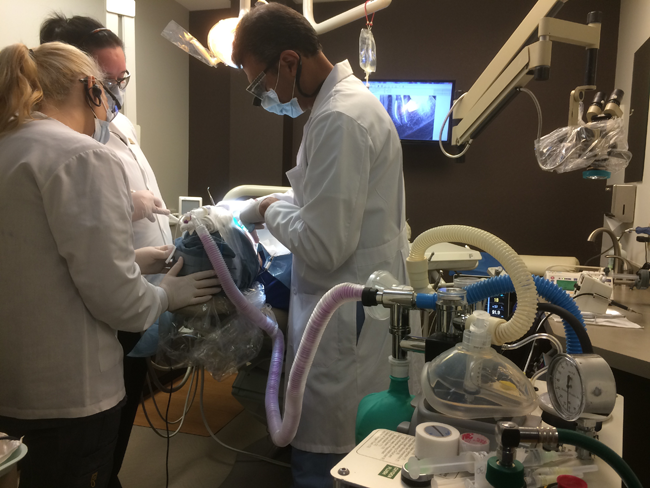Are your patients terrified of visiting your practice?
Some people hate going to the dentist-but here’s one possible solution to help patients feel safe and cared for.

With its magical powers rivaling duct tape and WD-40, superglue is an essential do-it-yourself tool in your armamentarium. If it’s broken, superglue can fix it.
While I often find myself using superglue to fix random things around the house, I never thought this same logic applied to teeth. But that is not the case for Angela, a resident of Cheshire, United Kingdom. Captured in a recent documentary series on BBC entitled “The Truth About Your Teeth”, Angela attempted to superglue her teeth back into place to avoid a trip to the dentist. Her fear of what the dentist would say and do prevented her from making an appointment, let alone getting treatment.
Worse yet, she felt so trapped, handicapped and self-conscious from her smile that she avoided social interactions with others. These problems affected more than her smile, but shook her confidence and damaged good eating habits. While these extremes are rarely documented, there are definitely more people just like Angela.
Related reading: Weird news: Woman superglued her teeth in to avoid going to the dentist
You have probably seen that same fear in your patient’s eyes as you carefully explain the treatment plan, tooth after tooth, quadrant after quadrant. Dental anxiety shows its ugly head and just like that, they are never to be seen again. Yet another person who could have been helped is lost into the crowd.

Or maybe you have experienced a different type of uncooperative patient. I still remember the moment I desperately tried to relax a patient comfortably into the chair, reassuring him that everything was going to be okay. It was no use. This particular child was developmentally delayed and attempting his first visit to the dental office. It was clear that sitting in the dental chair, let alone sitting for an exam, was out of the picture.
These patients are often subjected to a vicious cycle of poor oral health. A seemingly small problem turns into a debilitating disease, all because of an inability to see a dental professional. Poor oral health prevents so many people from living life to the fullest.
Even with the best of intentions and utmost skill, many patients will not or cannot receive traditional dental care. Whether it is due to extreme anxiety, an inability to cooperate, or an extensive treatment plan, there are many reasons that people are unable to receive care to achieve optimal oral health. When all else fails, what are you to do? Instead of turning patients away or having them lost to fear, there is another option.
Trending article: How to make dental anesthesia less of a pain
Have you considered a dentist anesthesiologist?
For many dental practitioners, the concept of a dentist anesthesiologist (DA) is foreign, but for others it is an integral part of their practice. With as few as 10 programs in North America, it is no surprise that this may be the first you have heard of this field. So what is a dentist anesthesiologist?
A DA is a dental specialist who attended a 2-3 year CODA-accredited program with extensive focus on hospital and ambulatory-based anesthesia practice. Additional rotations include family medicine, cardiology, emergency medicine and pain management. With extensive training in dentistry and anesthesia, a DA’s goal is to provide safe and effective anesthesia for even the most fearful or uncooperative patients.
While not all cases are suitable for the office-based setting, many patients who suffer from dental anxiety or who are uncooperative may benefit from these services. While the scope of practice for each DA is different, they work in multiple settings, including dental offices, surgery centers or hospitals.
Continue to page two for more...
Imagine working with a DA in the comfort of your dental office. You can work in your environment with a comfortably anesthetized patient. This dream is already a reality for many dentists. Many anesthesiologists practice mobile anesthesia by travelling to multiple offices to care for patients. The anesthesiologist brings his or her own supplies, medications and equipment in order to provide a safe anesthetic for you, the dental provider.
Perhaps you and the DA prefer a surgery center. Many DAs practice within surgery centers. While this may be a less convenient option than your own office, a surgery center may be a more appropriate setting for certain situations. A well-equipped surgery center can offer many services and amenities not afforded in a private office that can help you and your DA provide smooth and safe anesthetics. This offers an environment similar to the operating room without the costs associated with a hospital visit.
Trending article: Cognitive behavioral therapy found to help with dental phobias
However, some medically complex patients are best managed in the hospital setting. There are some DAs that work in hospitals throughout the country. Regardless of the setting, a dentist anesthesiologist can help provide safe and effective treatment to many different types of patients. Coming from the dental background, many of these providers are cognizant to the needs of a dental provider and can work with you to provide the best care to your patients.
As a dentist anesthesiology resident, defining this profession is a bit more personal. I want to help you deliver better care to your patients. Your patient’s safety is paramount as I listen to every breath they breathe and watch every heartbeat that beats on the electrocardiogram. My monitors deliver information and I react accordingly, titrating my anesthetic to every person’s unique physiology. Just like dentistry, anesthesia is an art, an art that I will continue to spend my life trying to perfect.
Trending article: New research discovers way to eliminate needles for dental anesthetic
I chose this profession after realizing that many people cannot receive the treatment they need. Some were just like the developmentally delayed patient I discussed. Others had severe apprehension and anxiety like some of my patients throughout dental school. While my reasons aren’t the same for every dentist anesthesiologist, the fact of the matter is many people benefit from these services every day. I can only hope to help as many people throughout my career.
While a relatively small field compared to other dental specialties, anesthesiology is essential to dentistry. With providers scattered throughout the nation, it may be the answer you have been looking for. So don’t let dental anxiety or uncooperative patients prevent you from treating those in need. Let a dentist anesthesiologist help you help others achieve healthier smiles.
For more information, visit the American Society of Dentist Anesthesiologists website at http://www.asdahq.org.
Oral Health Pavilion at HLTH 2024 Highlighted Links Between Dental and General Health
November 4th 2024At HLTH 2024, CareQuest, Colgate-Palmolive, Henry Schein, and PDS Health launched an Oral Health Pavilion to showcase how integrating oral and general health can improve patient outcomes and reduce costs.
Episode 31: Dentsply Sirona Implant Announcements
September 30th 2021DPR’s Editorial Director Noah Levine sat down with Gene Dorff, Dentsply Sirona’s group vice president of implants and Dr. Dan Butterman to review several big announcements the company made in the arena of implants during Dentsply Sirona World 2021 in Las Vegas.